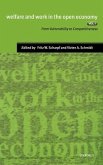In this ground-breaking, two-volume study of the adjustment of advanced welfare states to international economic pressures, leading scholars detail the wide variety of responses in twelve countries. Rejecting any notion of convergence to some kind of neo-liberal orthodoxy, they find that most countries have remained true to the basic features of their postwar model as they have liberalized. Moreover, within different welfare-state constellations, while some countries are still struggling to adjust, others have reached a new sustainable equilibrium. Volume I presents comparative analyses of differences in countries' vulnerabilities and capabilities, the effectiveness of their policy responses, and the role of values and discourse in the politics of adjustment. Volume II presents in-depth analyses of the experiences of Australia, Austria, Belgium, Denmark, France, Germany, Italy, the Netherlands, New Zealand, Sweden, Switzerland, and the United Kingdom as well as special studies in the participation of women in the labour market, early retirement, the liberalization of public services, and international tax competition.
Hinweis: Dieser Artikel kann nur an eine deutsche Lieferadresse ausgeliefert werden.
Hinweis: Dieser Artikel kann nur an eine deutsche Lieferadresse ausgeliefert werden.








